
A place of relaxation for citizens in normal times, and a trusted disaster prevention base where you can seek refuge in the event of a disaster.
We build facilities that contribute to the sustainable development of the region with collaboration throughout the region.
![]()
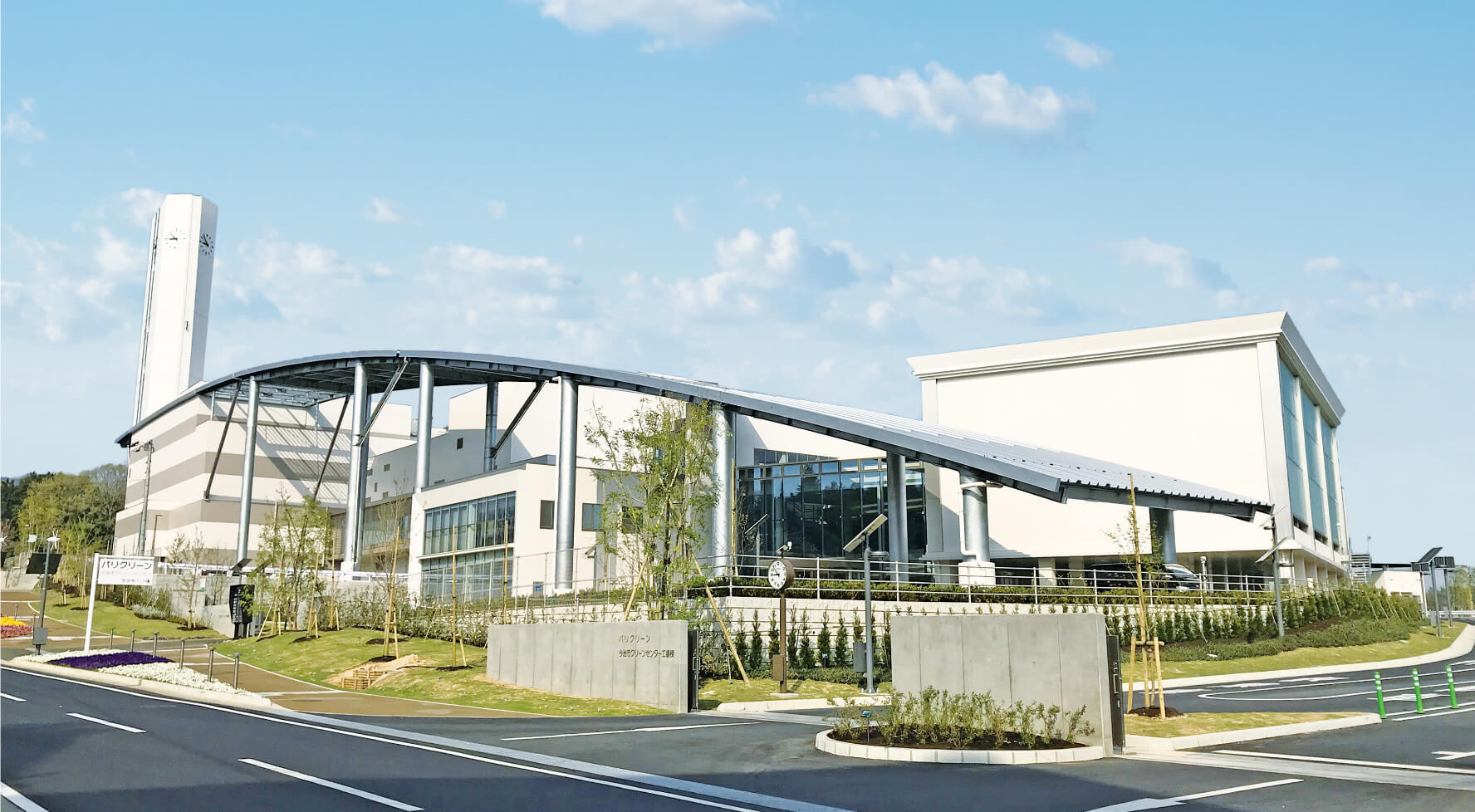
In recent years, disasters such as earthquakes, heavy rains, and large typhoons have occurred frequently in Japan. Under such circumstances, waste treatment facilities are expected more and more to serve as evacuation centers where residents can stay with peace of mind, because of their ability to generate electricity from waste even if there is a power outage as well as the resilience of the facility itself.
The facility that is drawing attention from all over the country is the Imabari City Clean Center (nickname: Bari Clean). It is a next-generation facility that has not only been selected as a "designated evacuation center" in Imabari City, but also won the Grand Prix, the highest award at the Japan Resilience Award 2019.
It is a facility that creates new value in the region where many citizens visit as a place for events, sports, and environmental education during normal times. In this article, we will introduce Bari Clean activities contributing to the sustainable community development that the SDGs are aiming for.
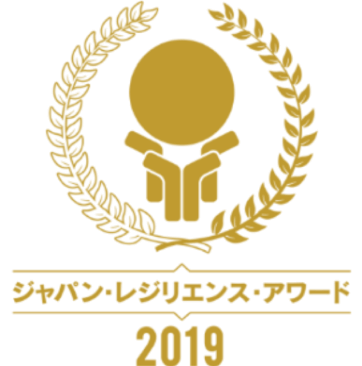
Bari Clean was completed in March 2018 as the first waste treatment facility in Japan to incorporate the new concept of "Phase-free". In addition to the stable treatment of waste generated by approximately 160,000 Imabari citizens, it contributes to the community both "normally" and "in emergencies" = "Phase-free" as a "citizens’ place for relaxation" in normal times and a "disaster prevention base" in the event of a disaster.
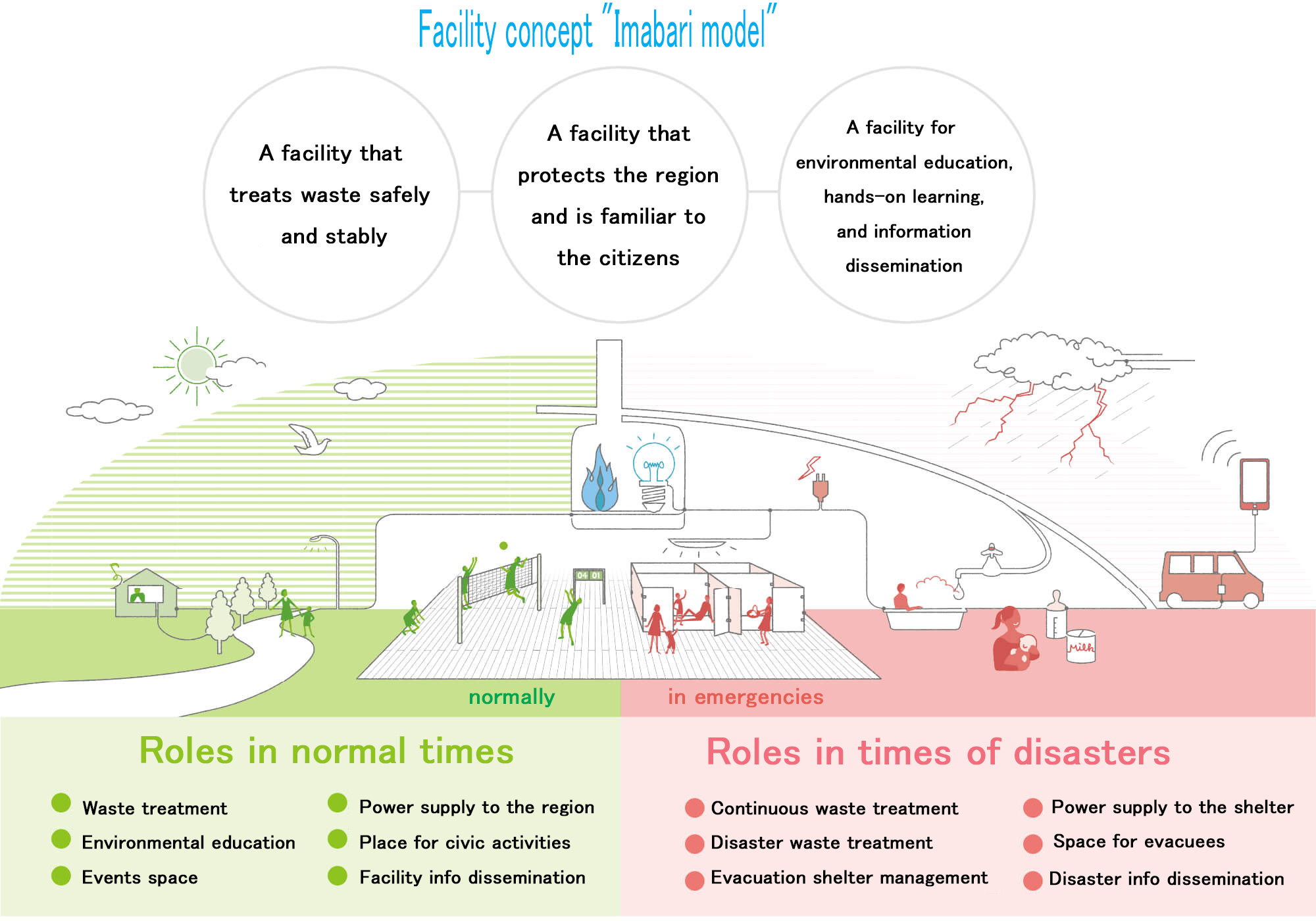
This is a new concept related to disaster prevention advocated by CEO Sato of Speradius Co., Ltd.. There are many products and services that are designed for every day use and those that are useful in disasters. On the other hand, phase-free products, facilities, and services are always useful regardless of the phase between normal times and disasters and therefore keep our QOL high, both normally and in emergencies. Since this facility has achieved a high level of phase-free design with dozens of items, it is also introduced as an advanced case in the "Phase-free Design Casebook".
About Phase-free
Phase-free Design Casebook
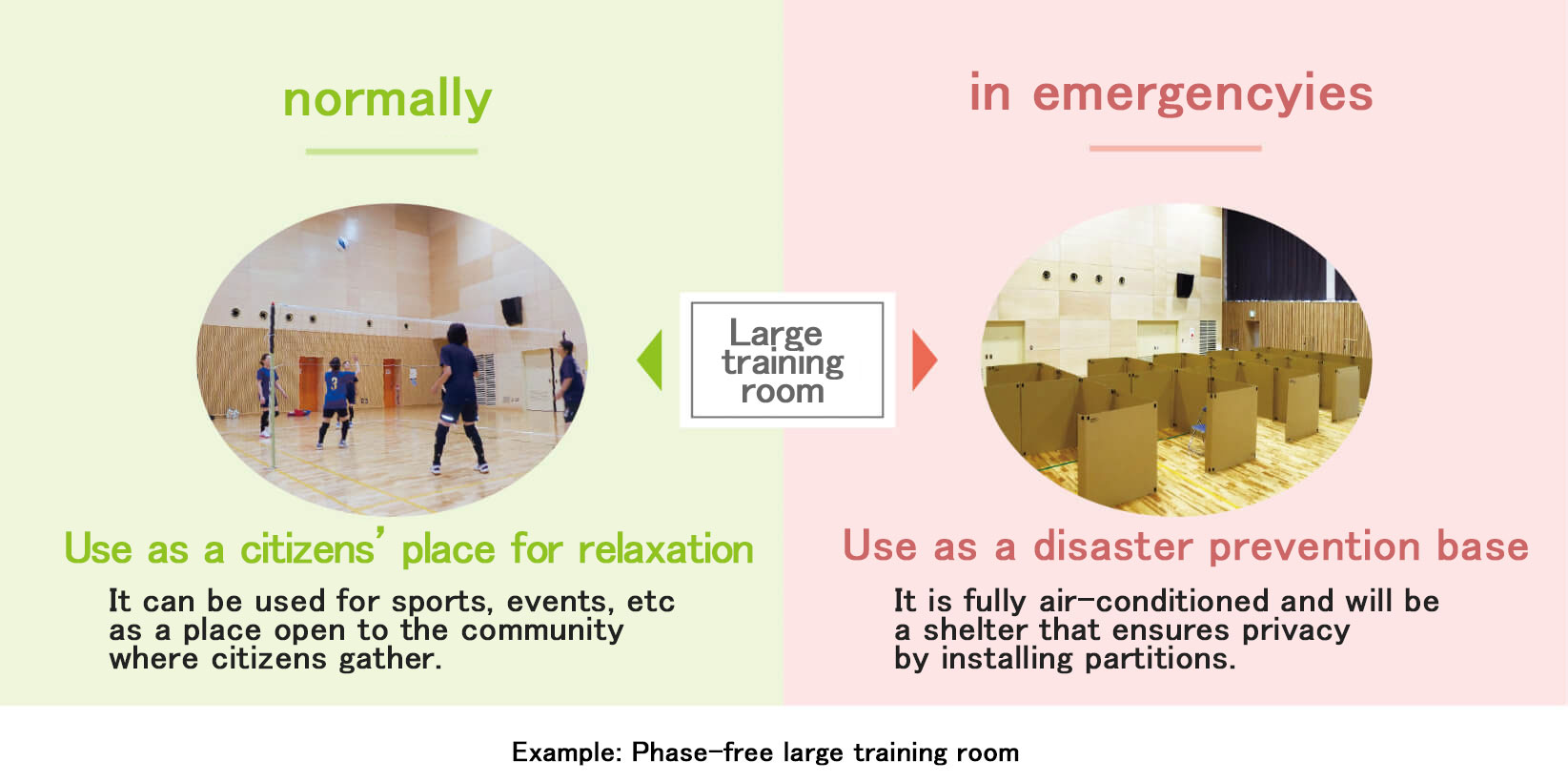
In past disasters, many shelters forced evacuees into unsanitary and uneasy conditions due to the suspension of infrastructure such as electricity, water and sewage. Bari Clean is equipped with functions that take advantage of the resilience of the waste treatment power generation facility so that it can be a safe and comfortable refuge shelter for all people even when infrastructure is down.
It is possible to send the generated electricity to the refuge shelter by incinerating the waste. In addition, it is equipped with an emergency generator so that lighting, air conditioning, showers, baths, IH cookware, etc. can be used even during a power outage.
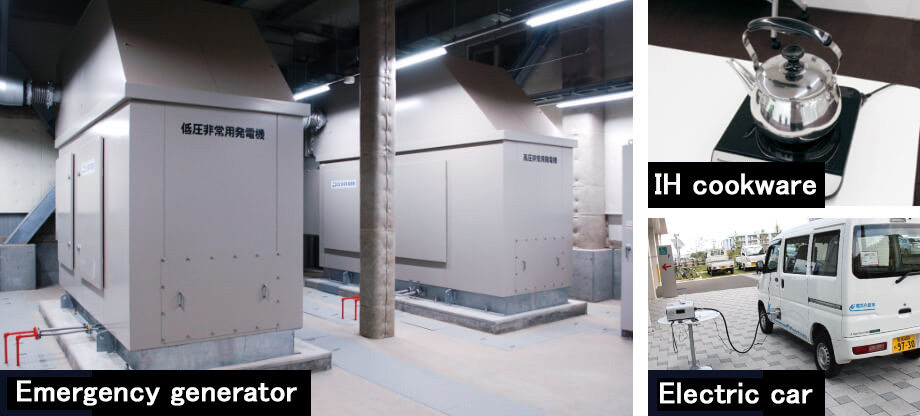
With advanced groundwater treatment equipment and disaster drainage storage tanks, even if the water and sewage systems stop working, toilets, washbasins, baths, and laundry necessary for a hygienic evacuation will stay available.
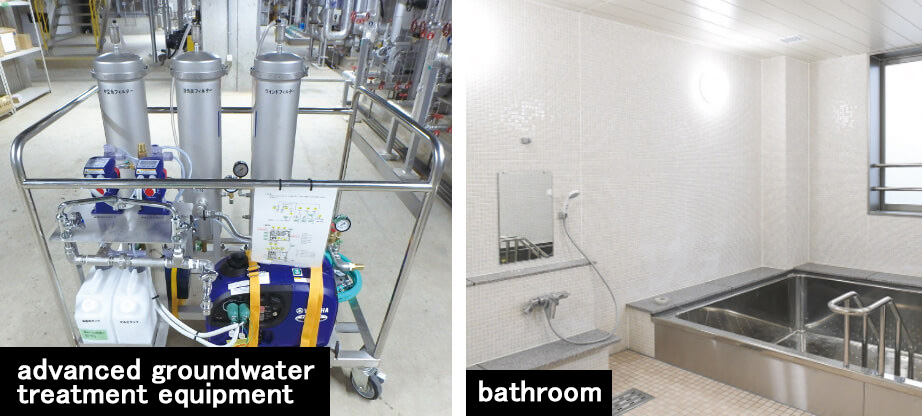
Since electricity is supplied from the plant even during a power outage, lighting, air conditioning, etc. can be used. In addition, partitions and individual spaces for pregnant women and the physically challenged will be secured so as to maintain a good shelter environment for all.
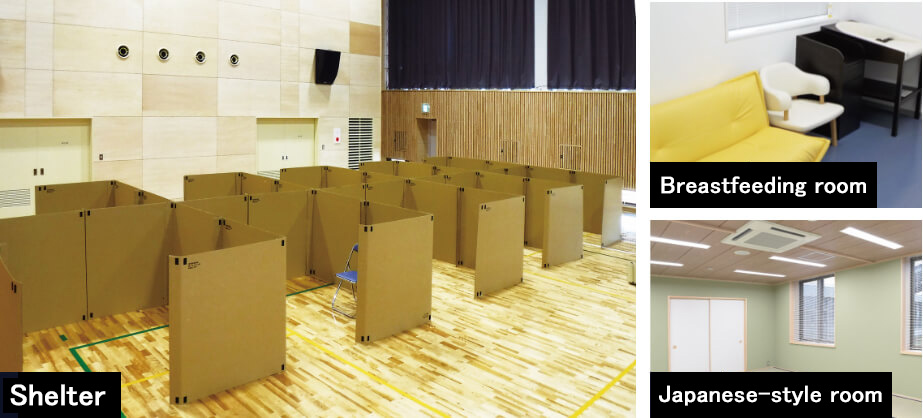
In addition to stockpiling daily necessities and food necessary for up to 320 citizens to take refuge for a week, stockpiles that meet diverse needs, such as adult disposable diapers and powdered milk have been prepared.
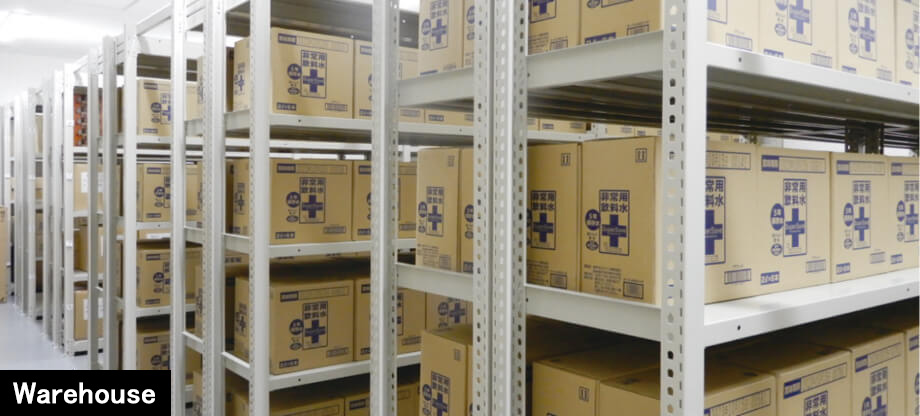
In the past, waste treatment facilities have not been equipped to accept evacuees in the event of a disaster. Also, since they had no experience of accepting evacuees, it took a lot of time and effort to accept them and caused confusion.
Bari Clean manages its refuge shelter smoothly by formulating its own business continuity plan (BCP), establishing a system for promptly accepting evacuees in the event of a disaster, building a collaborative system between the public, private, NPOs and citizens, and conducting annual training.
In collaboration between Imabari City, Imabari High Trust (Takuma Group), and well experienced local NPOs that carry out disaster relief activities nationwide, a complete system has been established to manage refuge shelters together with the citizens by addressing the shortage of personnel and experience that are issues in the event of a disaster.
Established a business continuity plan (BCP) unique to waste treatment facilities ahead of similar facilities nationwide. Even in the event of a disaster, the facility will be restored at an early stage, and will continue for both "combustible waste treatment" and "evacuation shelter function".
Evacuation shelter setup training is held every year. Imabari City, Imabari High Trust, local NPOs, citizens, etc. participate to improve their response capabilities and strengthen their cooperation system.
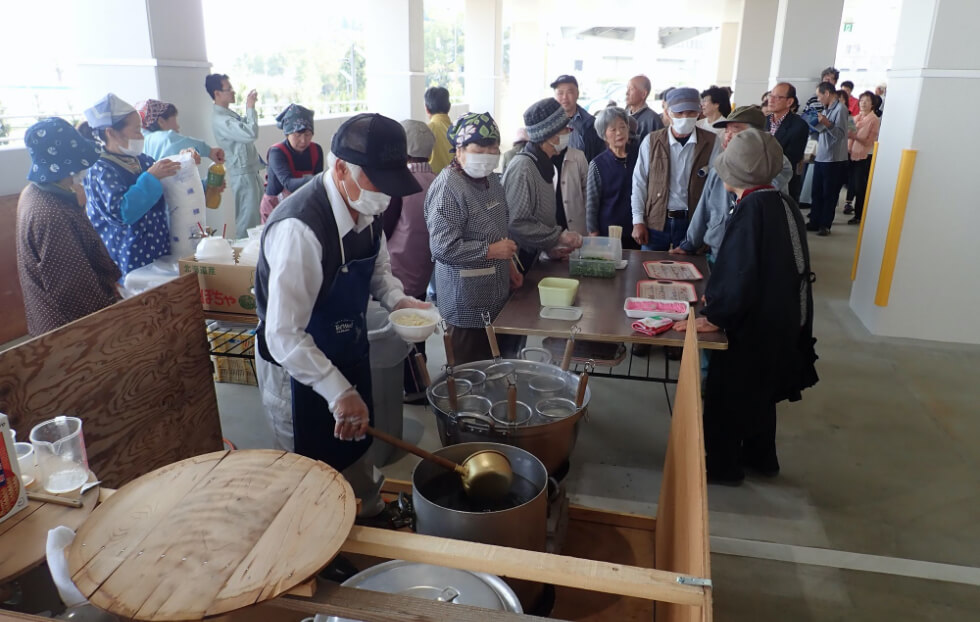
Soup kitchen training
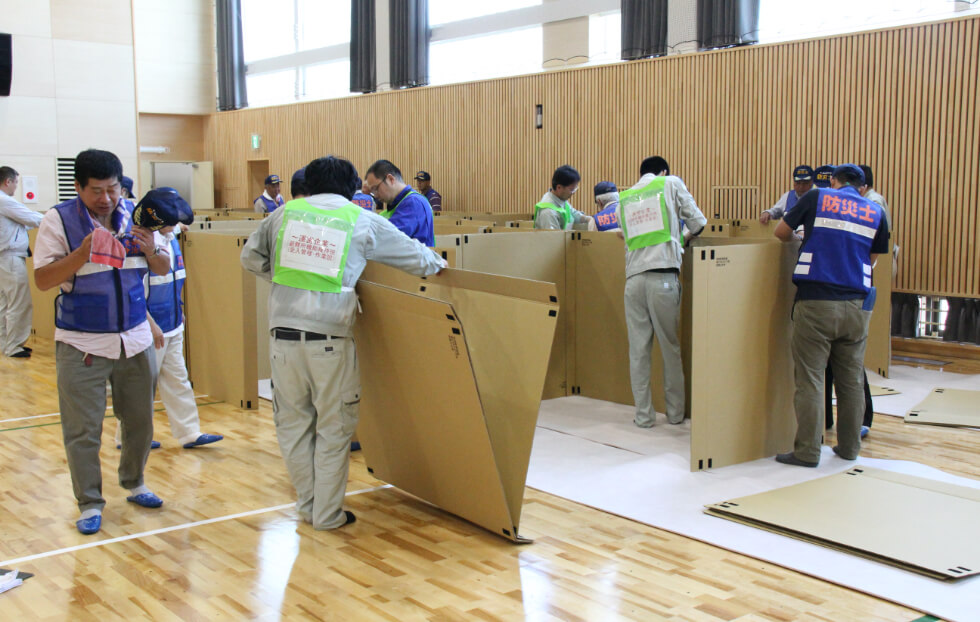
Evacuation shelter setup training
Since its completion, Bari Clean is actually making an outstanding performance as a facility that is useful to the community from both aspects of being useful in "normal" times and in times of “emergencies".
Conventional waste treatment facilities are generally only visited by elementary school students for social studies tours and not places that citizens can easily visit.
However, Bari Clean is different. It is widely used as a place for various events such as environmental education, regional exchanges such as sports activities, and environmental festivals, and is playing an important role as a " citizens’ place for relaxation" that is visited by more than 20,000 people annually.
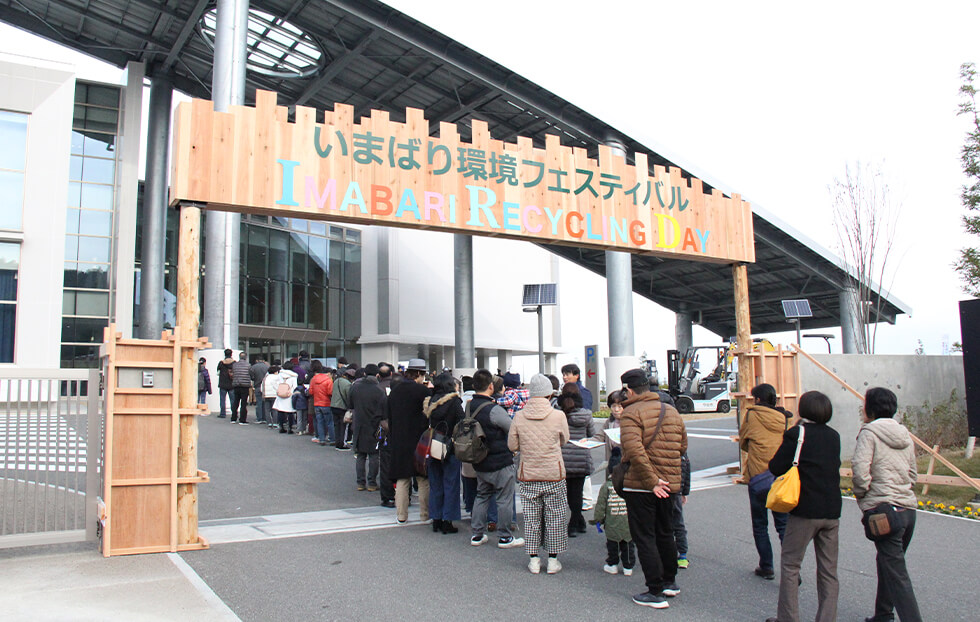
Event
(Imabari Environmental Festival: Facility entrance)
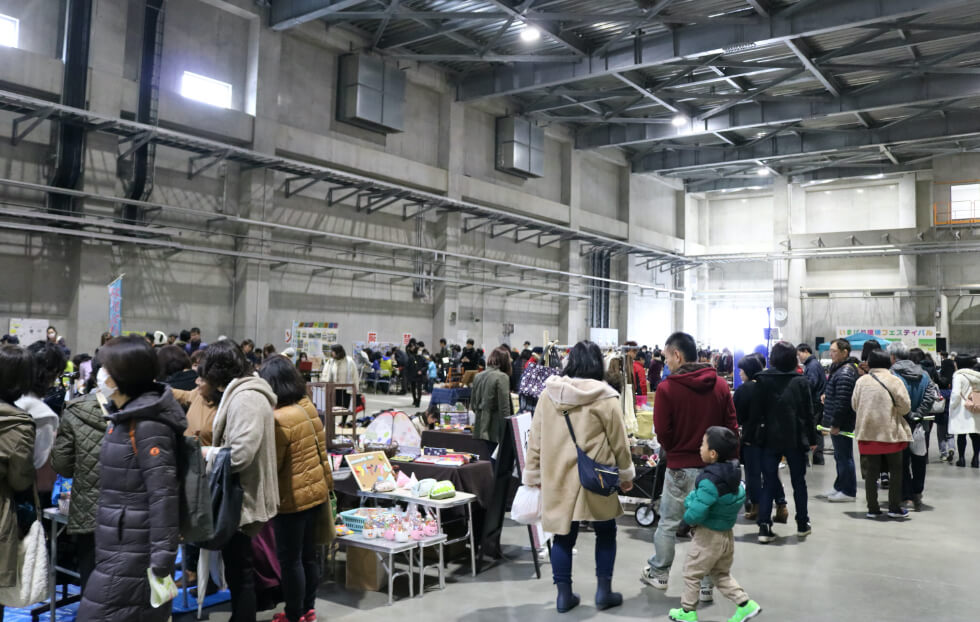
Event
(Imabari Environmental Festival: Flea Market on Platform)
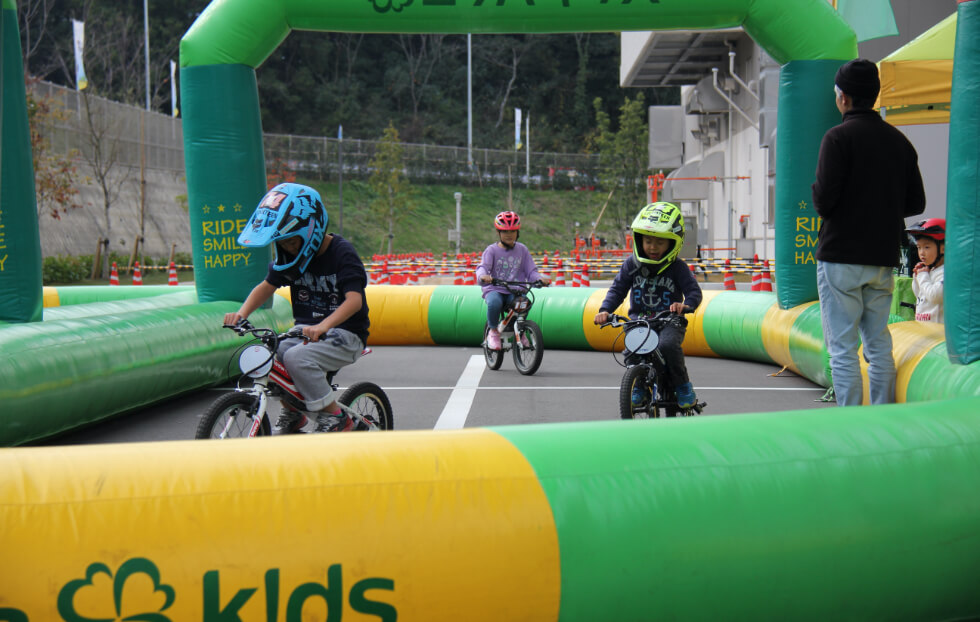
Event
(Imabari Environmental Festival: Bicycle trial ride experience)
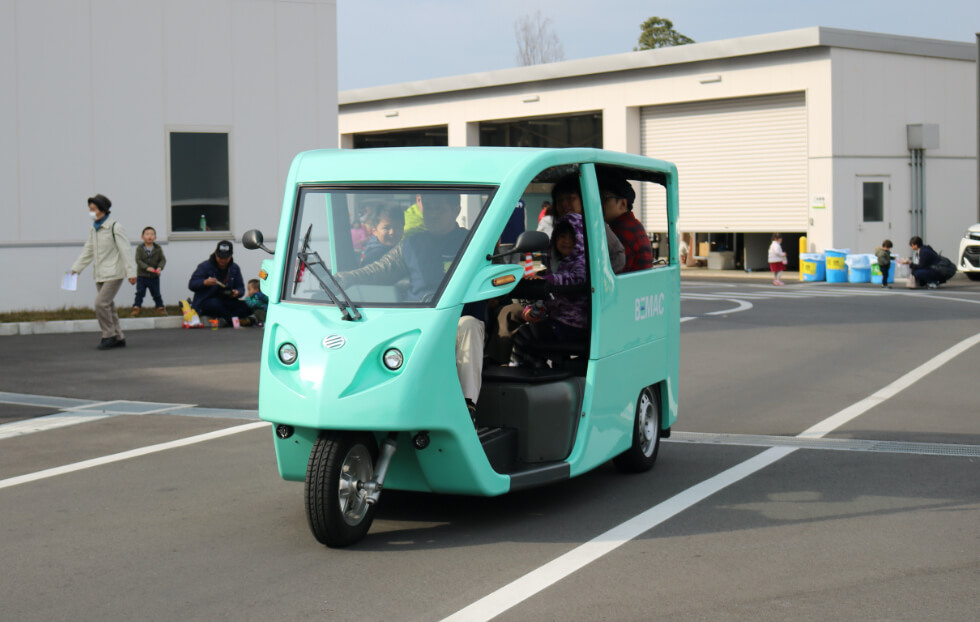
Event
(Imabari Environmental Festival: Electric Vehicle)
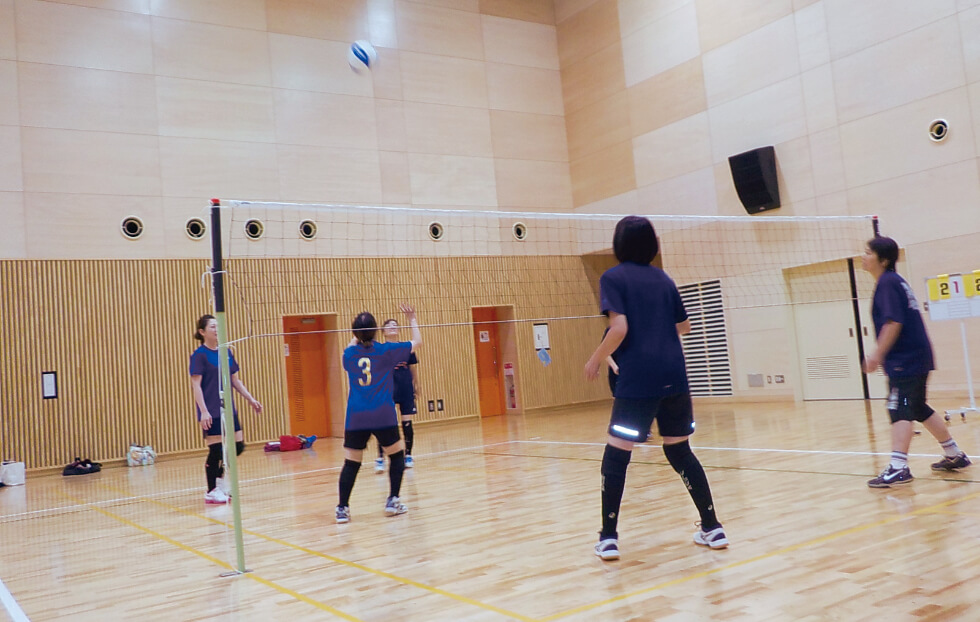
Large training room (sports)
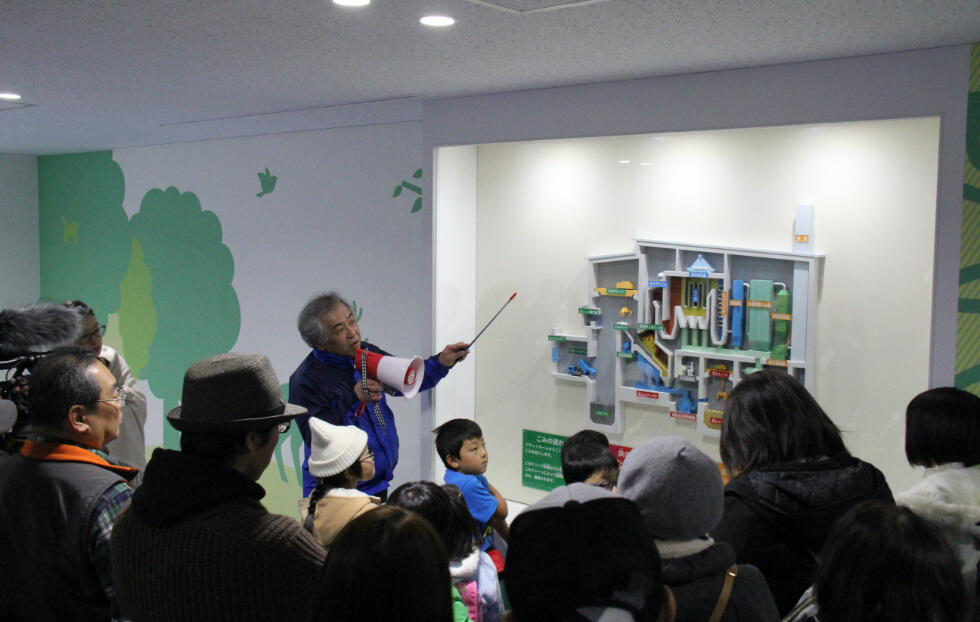
Facility tour
Due to the effects of climate change, natural disasters such as heavy rains and large typhoons occur frequently, and Imabari City has also suffered severe damage. In such occasions, this facility is playing a central role as a disaster waste treatment and evacuation shelter.
Due to record heavy rains, damage such as landslides and inundation damage occurred in parts of Imabari City. Under the guidance of an operator who has experience in treating disaster waste and an instructor dispatched from TAKUMA Group (a disaster waste treatment worker in the Great East Japan Earthquake), we maximized the functions of the facility and proceeded smoothly with the treatment of disaster waste.
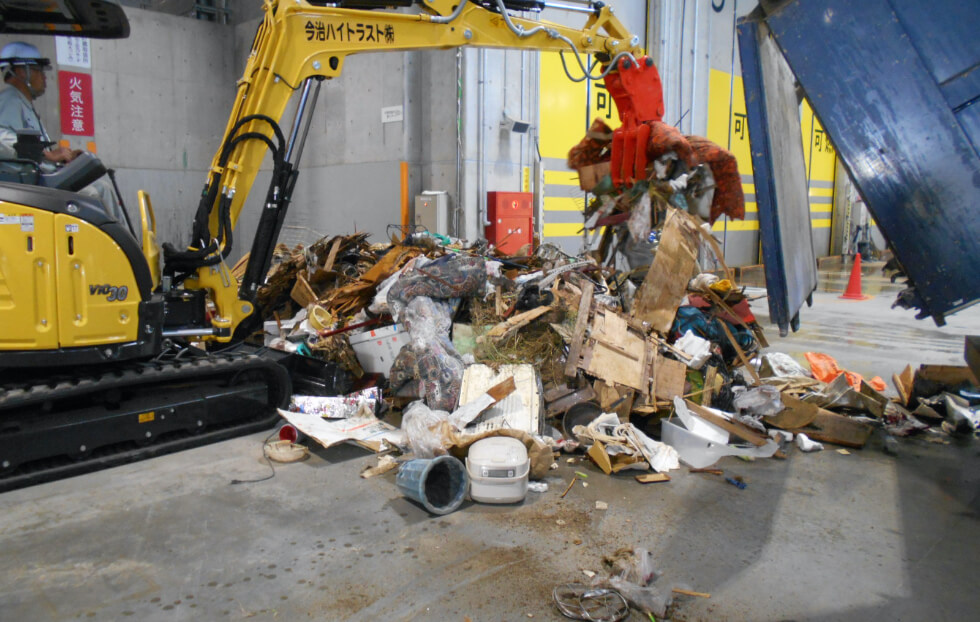
disaster waste treatment
When Typhoon No. 24 hit Imabari City on September 30, 2018, three people sought refuge with us because it was safer to find protection in the facility. We continue to disseminate information and conduct training so that more and more people can take refuge feeling a sense of security.
In addition to the value of stable waste treatment and CO2 reduction through effective use of energy, Bari Clean plays an important role as a new waste treatment facility where public, private and NPO collaborate to protect the community and provide sense of security serving as a " citizens’ place for relaxation" in normal times” and as a "disaster prevention base" in times of emergencies.
TAKUMA Group will not only continue striving to further promote phase-free facilities, but also utilize the knowledge and talents we have obtained through the operation of such facilities nationwide to provide solutions to regional challenges and to create new value in each region in collaboration with various players in order to realize sustainable community development through waste treatment facilities toward the realization of a sustainable society that the SDGs aim for.
In October 2019, Bari Clean's activities were broadcasted on Nankai Broadcasting's special program "Vision to protect the environment and protect the region" Imabari Model "drawn by Bari Clean".
What is "Phase Free"?(8分40秒)
Click here for links to the digest version and short version of the TV program
Vision to protect the environment and protect the region - Imabari model drawn by Bari Clean - digest version
Explaining the Imabari model!
Introducing the workings of waste treatment facilities
| Year and month of Issue (announcement) | Media | Name | Title |
|---|---|---|---|
| June 2018 | newspaper | The Waste Management (June 5) | Imabari City Bari Clean as a regional base of disaster prevention |
| October 2018 | lecture | National Convention for Life and Environment | Regional base of disaster prevention, Imabari City Clean Center |
| October 2018 | journal | Quarterly Environmental Technology Journal No. 173 | Regional base of disaster prevention, Imabari City Clean Center |
| November 2018 | journal | Life and Environment 2018, Vol.63, No.11 | "Phase-free" disaster prevention base, Imabari City Clean Center |
| November 2018 | journal | Journal of the Japan Institute of Energy Enerumikusu | Introducing the latest waste treatment facilities aiming for coexistence with the community |
| January 2019 | journal | Quarterly Environmental Technology Journal No. 174 | Special: Human resource development in the field of disaster waste 2nd human resource development case study - including “public-private partnership projects for waste treatment facilities“ |
| February 2019 | newspaper/td> | The Waste Management (February 25) | New value for the region - Imabari City Clean Center Initiatives - |
| March 2019 | journal | JEFMA No.67 (published by Japan Environmental Facilities Manufacturers Association) | "Phase-free" Disaster prevention attempts to create new value |
| March 2019 | awards | Japan Resilience Award 2019 | Imabari City Clean Center that connects people and the community with safety and security (winner of the highest award Grand Prix) |
| April 2019 | journal | Monthly magazine City and Waste Vol49 No.4 (April 2019 issue) |
New value for the region - Imabari City Clean Center Activities - |
| May 2019 | newspaper | The Environmental News | Featured facility with high-level disaster prevention function Imabari City Clean Center "Bari Clean" |
| June 2019 | journal | Monthly Waste (June issue) | Special feature "Waste treatment plant creates new value" Next-generation facility that protects the region "Phase-free" to increase value |
| June 2019 | WEB | Smart City News | National resilience and new disaster prevention concept "Phase-Free" |
| October 2019 | TV | Nankai Broadcasting | "Vision to protect the environment and protect the region" - Imabari model drawn by Bari Clean - |
| January 2020 | Lecture | Climate change adaptation measures for waste treatment and recycling in local governments 2nd briefing session (Ministry of the Environment of Japan) | "Development of waste treatment facilities in consideration of disaster response" -attempts of the Imabari City Clean Center- |
| March 2020 | WEB | Case Study of Phase-free Design | Imabari City Clean Center "Bari Clean" |
| June 2020 | journal | INDUST (June issue) | Quake-resistance and flood prevention measures of intermediate treatment facilities |
| June 2020 | journal | Environmental Management (June 2020 issue) | Attempts of Imabari City Clean Center which introduced its own BCP |
